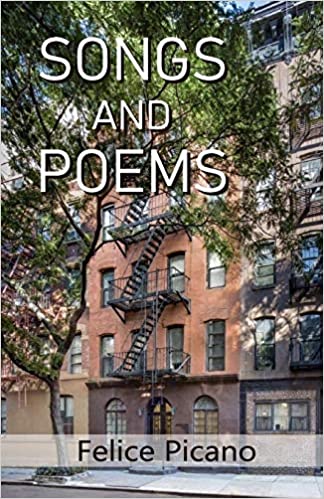
Songs and Poems – Felice Picano (Cyberwit)
Felice Picano has written over thirty books, mostly novels, short story collections, memoir, even some plays and screenplays, but Songs and Poems is his first poetry collection since The Deformity Lover and Other Poems (1977).
Amazon USAFelice Picano has written over thirty books, mostly novels, short story collections, memoir, even some plays and screenplays, but Songs and Poems is his first poetry collection since The Deformity Lover and Other Poems (1977). In the promotional page to his collection Picano notes that “it should really be titled Early Songs and Poems and Later Songs and Poems.” Many of the early poems were actually written before those in Deformity Lover; their publication now is due to the generosity of Picano’s friend, Dennis Sanders, who returned copies of “Fragments, 1972” and “On the Morton Street Pier, 1970,” which Picano had feared lost.
Picano indeed does organize his collection into two parts, early and late (i.e., poems that either predate or postdate Deformity Lover), each roughly equal in length, containing eleven and thirteen poems respectively. The earlier poems encompass a variety of forms, from sonnets (“Country-Pop Sonnet”) to odes (“Apples”) to pieces that are almost haikuesque in their brevity (“A Scroll by Mu Chi,” third in “Repaintings.”) The section ends with several longer pieces: selections from “On the Morton Street Pier, A Poem Suite,” “Repaintings” (four distinct poems, each describing a different objet d’art), and ending with “In Memoriam: Wystan Hugh Auden, 1973.” “In Memoriam” is definitely my favorite of this section: a beautiful homage, it describes perfectly the sense of dislocation one feels upon learning of a friend’s death (often under perfectly ordinary, even boring, circumstances), the reminiscing afterward, the refusal to avoid communal rituals of mourning in favor of more personal memorials.
The thirteen poems of the second section follow a similar pattern, beginning with shorter pieces, followed by longer works (“My Mother’s Life,” which is original to this collection, and “Window Elegies”) before ending with one final sonnet (the melancholic “Envoi”). Not surprisingly, the poems in this section are much more reflective, dwelling on such themes as loss, regret, and the inevitable endings (of relationships, of lives) that one encounters later in life. My favorites in this section are the aforementioned “Envoi” (because I cannot resist a good sonnet) and the (ironically?) titled “A Late Aubade.” The latter is part of a long tradition of “dawn songs”–poems about lovers leaving each other at dawn, after spending the night together; except here the lovers meet in the afternoon, perhaps to part at dusk.
This collection is aptly named. Poetry, I feel, should be spoken and heard, not just silently read: while reading these poems, I was struck by their innate lyricism, and thought how easily they could be set to music; in particular, a set of the later poems almost read like country-pop lyrics (“Lifted,” New Orleans Girls,” “Ashes and Ice,” and “Break Down”). Upon reading Picano’s promotional page I learned that, yes, indeed, many of these poems have been set to music: composer Walter Torgensen set some of the earlier poems, which Jackie Curtis sang in her act, and a California inmate from a medium security facility had set many of the later poems to music while incarcerated. These poems, indeed, should be sung and heard.
Picano writes with a clarity that makes reading his poetry a delight: no obtuse language or pretentious wordplay obscure the situations described therein—the reader never has to wonder what’s going on, or if an image is “just” a metaphor for what he’s “really” writing about. Even if you’re a reader whose love of poetry was destroyed by modern education, you will enjoy these poems for their humor, honesty, directness, and keen insight into the human condition.
